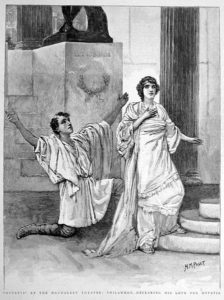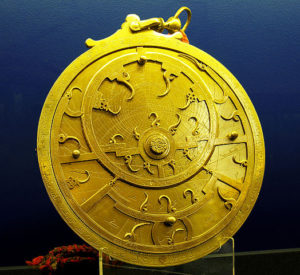Humanist EDge: Appreciating Hypatia, Neoplatonist & Proto-Humanist
 "Hypatia at the Haymarket Theater" (H.M. Paget, 1893)
"Hypatia at the Haymarket Theater" (H.M. Paget, 1893) Though Hypatia was, technically speaking, a pagan and apparently a believing one at that, she deserves a place on any list of humanist women. She was a proto-humanist in more ways than one. For example, she said, “Reserve your right to think, for even to think wrongly is better than not to think at all” and also that “fables should be taught as fables, myths as myths, and miracles as poetic fantasies. To teach superstitions as truths is a most terrible thing.”
Hypatia, who died in 415 CE, lived when the Roman Empire was fragmenting and Christianity was becoming the undisputed master of its fragments. Historians once called this era the Dark Ages, though nowadays that’s considered uncharitable by most historians. Still, the conversion of the Roman world from various religions to one religion didn’t happen as painlessly or as quickly as Christian apologists tend to propose. Also, the rise of Christianity did lead to a darkening of the prospects for more measured religious and philosophical thought.
Hypatia was exceptional in the Alexandria of her time (and by any standard). She was a cutting-edge mathematician, editing and writing commentaries on Euclid and Ptolemy. She constructed her own astrolabe and hydrometer. And she taught philosophy, specifically what has come to be known as Neoplatonism, which made the Christian authorities unhappy.

Hypatia is thought to have constructed an astrolabe, a device used to calculate date and time based on the positions of the stars and planets.
While elements of Neoplatonist philosophy later transferred to Christian theology, in the early years of the Common Era, Neoplatonists began not with the Platonic idea of ideal forms for all existence but an understanding that mathematical equations and geometry are systems of ideal forms. No, ideal forms don’t exist, but human constructs such as mathematics can function to describe reality.
Perhaps the most commonly known fact of Hypatia’s life is that she was murdered by a group of Christian monks. Why they did it has never been definitively explained. She may have been murdered because she was caught up in the complex politics of Alexandria. Or perhaps she was a “philosophical martyr,” dying for her continued insistence on her paganism. It’s the latter assumption that has made her appealing to humanists and freethinkers.
We’ll never know conclusively why Hypatia was murdered. However, we do know that she said this:
In fact human beings will fight for a superstition quite as quickly as for a living truth—often more so, since a superstition is so intangible you cannot get at it to refute it, but truth is a point of view, and so is changeable.
Yes, that’s a humanist point of view!
